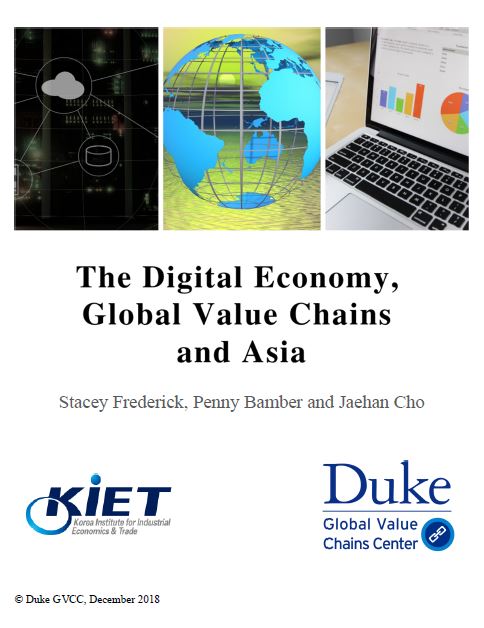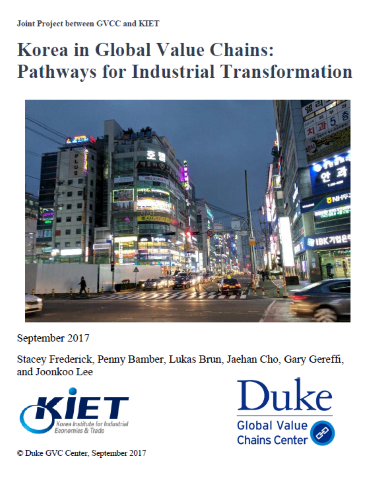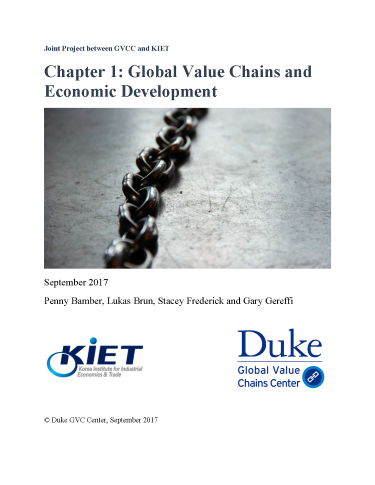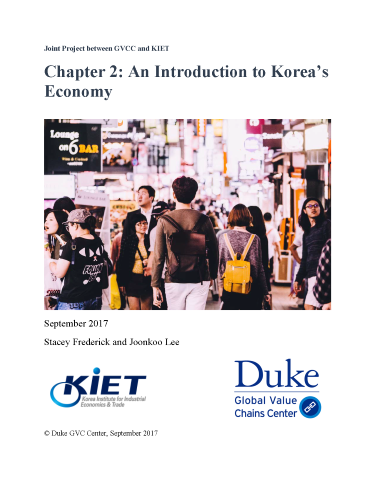GVCC and the Korea Institute for Industrial Economics & Trade (KIET) investigated industrial upgrading opportunities for the Korean economy from a GVC perspective. The project team included Stacey Frederick, Penny Bamber, and Lukas Brun, and in Korea, Joonkoo Lee at Hanyang University, and Jaehan Cho at KIET. The research focused on the evolution and current status of the electronics and shipbuilding industries in Korea, and where Korea is positioned in these industries from a regional and global perspective. The research highlighted the importance of using a GVC framework when creating industrial policies in a developed country. This was followed by a second project on the Digital Economy and GVCs and in Asia.
Korea in Global Value Chains: Pathways for Industrial Transformation
The GVC framework is useful in helping developed countries understand how to remain competitive and continue to push innovation boundaries in an increasingly automated, connected and service-driven world. Korea provides an interesting case for understanding the implications of the rising phenomenon of servicification of GVCs for economic growth. This is essentially the presence of services to complement traditionally strong manufacturing sectors.
Korean economic policies of the past have transformed the country from a rural economy into an industrialized one. GDP has quadrupled since the late 1990s alone, to $1.4 trillion in 2016, making it the world’s 11th largest economy. Success to date has been based on well-known global giants, such as Samsung and Hyundai, with strong support by the national government.
However, the country has focused its innovative energies on a small set of traditional manufacturing industries and technical know-how. Korea must adapt in an increasingly service-driven landscape that will look quite different due to automation and other dynamics. Such services – sold independently of physical manufactured products – include collection and analysis software, logistics, research and supply chain management expertise. New pre- and post-production services such as after-sales data driven knowledge services are creating different business models such as clients paying a fixed subscription or per-use fee as opposed to purchasing equipment outright.
Servicification is not the only driver of the shifting landscape in manufacturing. The rise of automation and the incorporation of new disruptive technologies into supply chains are making production operations increasingly capital-intensive rather than labor-intensive, favoring more developed countries. Korea is well positioned to incorporate a growing share of automation technologies into its production operations because of its strong technological capabilities and its proximity to a growing Asian market.
Korea can reorient its strengths by prioritizing change in three key areas.
1. Industry Stakeholder Coordination and Collaboration. Participation in today’s complex GVCs demands industry stakeholder coordination and collaboration to ensure that interests are aligned, skills gaps are met, constraints are overcome and regulation is supportive for development. Organized action to assess, formulate and implement specific initiatives is essential for industry upgrading. The country’s previous hierarchical industrial policy approach allowed Korea to technologically “catch up” with other industrialized countries. Over the past decade, Korea has been transitioning from this bureaucratic approach to a new industrial policy model that is more inclusive of a broader range of actors, although these are mostly local. This new model has not always been successful and has encountered duplication of efforts. Future upgrading will require a suitable institutional development, which effectively includes all actors from small and large firms alike, and R&D centers to universities and labor organizations from across all major economic sectors. These need to include both local and foreign entities to help absorb and contribute to the latest global discoveries.
2. Entrepreneurship. The most innovative countries today recognize the value of small and innovative service firms to their economic development and put in place policies to create a conducive environment for their emergence and growth. Korea’s industrial policy environment has long emphasized manufacturing over services, and prioritized large firms over small. This compounds the challenges for creating the new knowledge-based services firms for the future. The local regulatory environment remains significantly more stringent for services than manufacturing. In 2013, there were four times as many regulations for services, according to the OECD. The Korean government needs to play a facilitating role in establishing creative hubs that can be hotbeds for the emergence of new ideas, while supported by policies that make core procedures for setting up and running a business easy.
3. Innovation Systems and Human Capital. Korea needs a well-structured innovation system with a focus on incentivizing cutting-edge research, developing the right types of human capital, and promoting mechanisms for the adoption and diffusion of new knowledge and technological capabilities to business. Service provision relies on an entirely different set of skills from those that make countries and firms great manufacturers. Thus education systems need to develop people with the skills to create software that enables increased automation and connectivity as well as people who know how to use technology to analyze and interpret data.
Currently, about three-quarters of business-sector R&D is carried out in high and medium-high technology manufacturing industries, primarily within electronics and automotive. Korean firms in these industries have well-established private R&D operations while universities contribute less than 1% of R&D funding. A challenge for the country will be to reorient its public R&D systems toward a more balanced approach with a stronger focus on universities and international collaborations.
View the article from Sept. 2017 by Frederick & Bamber on Medium.






